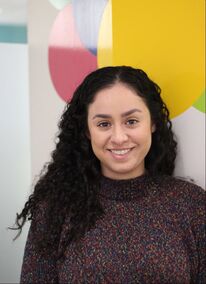
I graduated from San Francisco State University in 2013 with a Bachelor’s Degree in Sociology and a minor in Latino Studies. After graduating, I worked at the Center for Research and Education on Gender and Sexuality at San Francisco State University as a Research Assistant on studies examining relationship dynamics and decision-making among gay couples living with HIV, as well as a study examining contraceptive decision-making among African-American and Latina women. In 2016, I graduated from the University of California, Berkeley with a Master of Public Health in Maternal and Child Health. After graduating, I worked as a Research Associate for the Sexual Health and Reproductive Equity program at UC Berkeley’s School of Social Welfare, undertaking research to advance the understanding of what it takes for individuals to have the families they envision, to realize reproductive autonomy, and to experience healthy sexuality. Most recently, I worked at the San Francisco Department of Public Health as a Program Associate for the Collective Impact to Prevent Preterm Birth, a program bringing together city leaders to address the high rates of preterm birth among African-American women in the city.
What is your current role?
I am a Research Assistant on the Mental Health team at the BSU. I will mainly be working on the Difficult Discussions study, a mixed-methods evaluation of the acceptability and perceived utility of the advanced-care planning tool for young people, Voicing My Choices. Because this tool was developed by researchers in the U.S., this study aims to adapt this tool for use with Australian adolescents and young adults. Currently, the study is entering its second stage, in which we will conduct think-aloud interviews with adolescent and young adult cancer patients and survivors to gain feedback on suggested changes to the tool that resulted from the first stage of the study.
What are the ‘best’ parts of your current role?
So far, I have immensely enjoyed immersing myself in the data collected from the first stage of the study, learning about the experiences of young people, parents, and healthcare providers who have been touched by cancer. I am greatly looking forward to talking with young cancer patients and survivors about their experiences in the second stage of interviews. I am also thrilled to have the opportunity to work with and learn from such a diverse and talented group of individuals on the Mental Health team as well as the greater BSU team.
What are the most challenging parts of your role?
The Difficult Discussions study is a challenging project in that it is all about initiating conversations about what to do if cancer treatment is not successful. It is disheartening to sit in a space of impending loss, but, ultimately, I am happy knowing that I will be contributing to the development of a tool that could potentially help young people find some peace and control at the end of their lives.
Where do you see yourself in five years’ time?
It is hard to envision where exactly I will be in five years. I hope to be working toward a PhD or, at the very least, conducting research that will shed light on important and understudied topics as well as advance equity for disadvantaged communities.
What advice would you have for someone wanting to follow a similar path in terms of their study/career?
One piece of advice I always try to pass along is to always be open to learning. As someone who has worked in direct service and research, much of what I have learned has come to me from clients and study participants, often at times when I am least expecting it. Similarly, I would encourage people to listen to others’ stories. Often, peoples’ stories can get lost in research. Holding space for these stories can help us stay true to those we are trying to affect with our work. Lastly, I would also encourage people to find mentors who are committed to helping them succeed. I met my mentor six years ago and would not be where I am today without her guidance and dedication. I look forward to following her example and mentoring others when the time comes.
 RSS Feed
RSS Feed